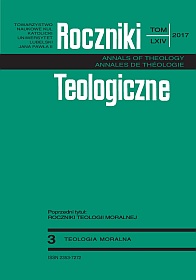Human Conception and the Single-Celled Human Zygote Status from the Catholic Bioethics Perspective
Abstract
In the discussions on the human zygote status, the issue of its animation appears only exceptionally. Current Church Magisterium teaching on the beginning of human life highlights the fact that the life begins with the conception. The moment when single-celled zygote comes into being is very often considered as a start of a new human life. As embryology states, this takes place 12 to 24 hours after fertilization. The epigenetics discoveries allow to claim that a human character of a zygote is defined. From the moment of conception, that is when the head of spermatozoon combines with oocyte cytoplasm and two pronuclei come into existence (the nuclei of both male and female gametes), the processes related to a new human life begin.
References
Bartel H., Embriologia, Wyd. Lekarskie PZWL, Warszawa 20074.
Daniels J.R., Bolton V., Monk M., Imprinted Expression of SNRPN in Human Preimplantation Embryos, „The American Journal of Human Genetics” 1998, nr 63, s. 1009-1014.
Gibbs W.W., Genom ukryty poza DNA, „Świat Nauki” 2004, nr 1, s. 58-65.
Härle W., Menschenwürde – konkret und grundsätzlich, w: Menschsein in Beziehungen. Studien zur Rechtfertigungslehre und Anthropologie, Tübingen 2005.
Kohda T., Ishino F., Embryo Manipulation Via Assisted Reproductive Technology and Epigenetic Asymmetry in Mammalian Early Development, „Philosophical Transactions of the Royal Society B: Biological Sciences” 2012, t. 368, nr 1609. Http://rstb.royalsocietypublishing.org/content/368/1609/20120353 (dostęp: 13.05.2017).
Łukasik M., Karmalska J., Szutowski M.M., Łukaszkiewicz J., Wpływ metylacji DNA na funkcjonowanie genomu, „Biuletyn Wydziału Farmaceutycznego Warszawskiego Uniwersytetu Medycznego” 2009, nr 2, s. 13-18. Http://biuletynfarmacji.wum.edu.pl/0902Lukasik/Lukasik.html (dostęp: 15.05.2017).
Machinek M., Spór o status ludzkiego embrionu, Wyd. UWM, Olsztyn 2007.
Midro A.T., Genetyczne i epigenetyczne uwarunkowania płci człowieka, w: Gender. Spojrzenie z różnych perspektyw, red. W. Wieczorek, Wyd. Szkoły Wyższej Przymierza Rodzin, Warszawa 2015.
Midro A.T., Hoser H.F., Problemy bioetyczne ingerencji medycznych zaburzających genetyczne i epigenetyczne uwarunkowania rozwoju człowieka. „Family Forum” 2015, nr 5, s. 29-42.
Mieth D., Konfessionelle Identität in der biomedizinischen Debatte? Relecture der Beseelungstheorie bei Thomas von Aquin, „Ökumenische Rundschau” 51(2002), s. 315-327.
Otowicz R., Etyka życia. Bioetyczny i teologiczny kontekst problematyki życia poczętego, Wyd. WAM, Kraków 1998.
Schockenhoff E., Etyka życia. Postawy i nowe wyzwania, Wydz. Teologiczny Uniwersytetu Opolskiego, Opole 2014.
Sikora W., Dziedziczenie epigenetyczne, Zakład Biofizyki Obliczeniowej i Bioinformatyki. Wydział Biochemii, Biofizyki i Biotechnologii. Uniwersytet Jagielloński. Http://bioinfo.mol.uj.edu.pl/articles/Sikora05 (dostęp: 28.10.2014).
Speroff L., Fritz M.A., Kliniczna endokrynologia ginekologiczna i niepłodność, MediPage, Warszawa 2007.
Spork P., Drugi kod. Epigenetyka, czyli jak możemy sterować własnymi genotypami, Wyd. W.A.B., Warszawa 2011.
Szewczyk K., Bioetyka, t. 1: Medycyna na granicach życia, Wyd. Naukowe PWN, Warszawa 2009.
Ślipko T., Granice życia. Dylematy współczesnej bioetyki, Wyd. WAM, Kraków 19942.
Watson J.D., Crick F.H.C., Molecular Structure of Nucleic Acids: A Structure for Deoxyribose Nucleic Acid, „Nature” 1953, nr 171, s. 737-738.
Wróbel J., Kiedy ciało może przyjąć duszę, „W drodze” 1990, nr 3(199), s. 19-29.
Wróbel J., Godność poczętego życia ludzkiego, „Homo Dei” 1992, nr 2-3, s. 36-51.
Copyright (c) 2017 Roczniki Teologiczne

This work is licensed under a Creative Commons Attribution-NonCommercial-NoDerivatives 4.0 International License.





